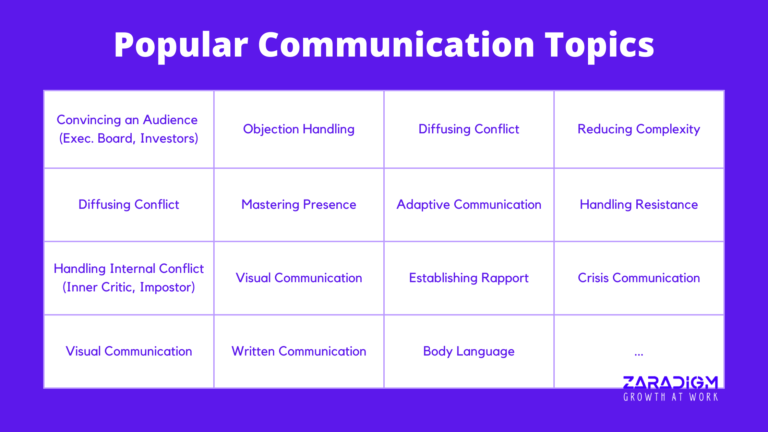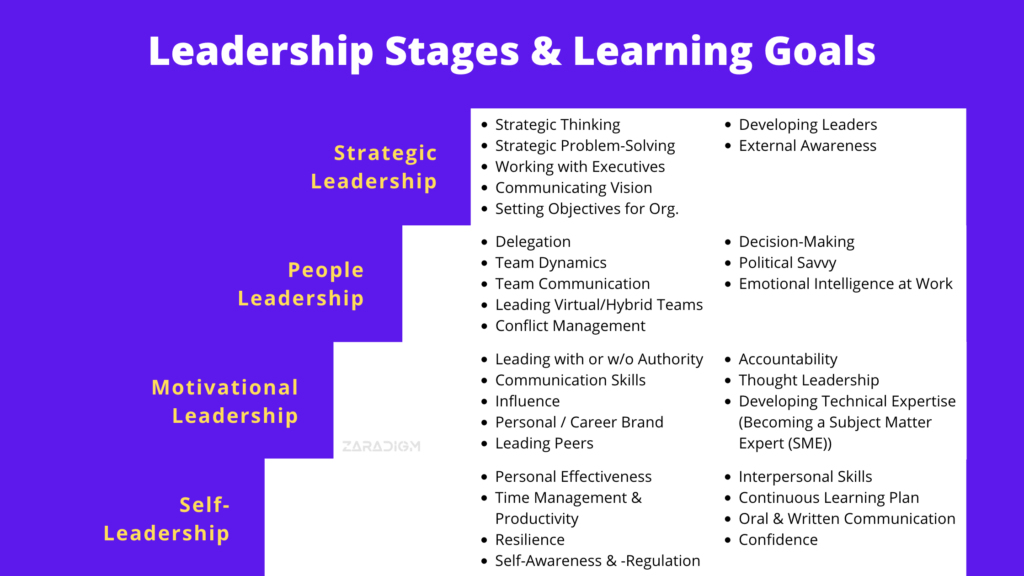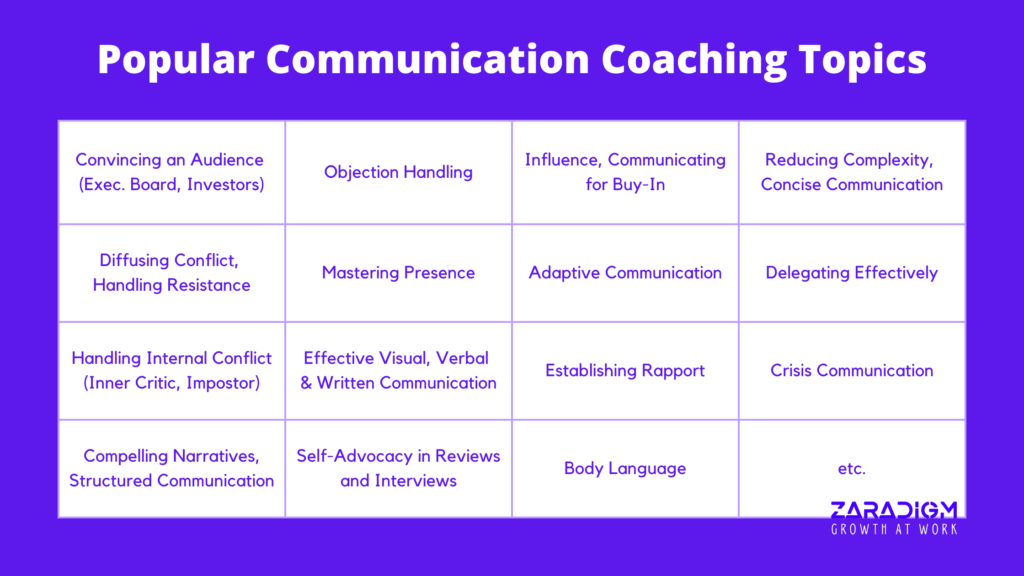- Home
- A Powerful Leadership Communication Program
A Powerful Leadership Communication Program
Our Leadership Communication Program
What is Leadership Communication?
At ZARADIGM, we specialize in high-stakes communication, so we look at leadership communication from three angles:
- Building high-performance teams (using communication to lead others)
- Interacting with senior leaders (strategic communication with seasoned leaders)
- Building your brand (leadership style, perception, ambition)
Overall, leadership communication aims at equipping you with the leadership skills that will be most frequently expected of you at any organization.

Leadership communication focuses on those communication skills that are most critical to the success of leaders. This may differ slightly depending on the role of the leader in the organization, but often includes:
- Convincing senior executives
- Handling objections, employee resistance, conflict, or market crises
- Presenting in high-stakes situations such as investor and board meetings
- Driving transformation and mobilizing teams
- Drawing and holding attention, and resonating through stories
The skillsets that enable the ability to master these typical challenges and similar ones are key to success. This makes leadership communication coaching a key investment for both organizations and individual leaders since success in this area is key to success in critical business areas.
Why Is Communication Important in Leadership?
Great Communicators Increase Engagement
Employee engagement is massively important because engaged employees will work harder; stay with the organization longer; improve customer service; and generally lead to better business outcomes, according to Gallup research. In fact, employee engagement is one of the most significant drivers of organizational success. So why aren’t companies doing everything they can to make sure their employees feel engaged?
The answer isn’t complicated. Most people don’t feel engaged because they don’t trust their leaders. They don’t see their leader as someone who shares the same values as them, believes in the mission of the organization, and is committed to helping them achieve their goals.
And without trust, there is no way of knowing whether the organization is really acting in good faith or whether it is just trying to manipulate you into thinking that way. Without trust, employees won’t put their hearts into solving problems, improving customer service, and achieving great things together.
But how does a leader earn trust? Employees want trustworthy leaders. That’s why it’s critical for leaders to communicate honestly and openly, especially during times of change. When leaders share the vision of the organization and show by actions that they truly care about its future, employees will begin to trust them.
Great Leaders Build Trust And Communicate Transparently
The global crisis of leadership is evident across every region and demographic. A study conducted by Edelman found that trust in political leaders has fallen dramatically over the past decade. In the United States, trust in Congress fell to 11% in 2018, down from 17% in 2009. This same trend is seen throughout the world; in Canada, trust in Parliament is at a historic low of 8%; in Germany, trust in the government is at a record low of 7%; and in Australia, trust in politicians is at a 20-year low of 5%.
In addition, people are increasingly turning away from traditional news sources. For example, in the United Kingdom, trust in newspapers has declined by 30% since 2012. And in the United States, trust among millennials in media companies has plummeted by 50% since 2016.
Edelman’s research reveals that people are looking for leaders who can bring about change, solve problems, and make things better. They want leaders who are honest and transparent, and who are willing to listen to others. However, they don’t believe that anyone has these qualities today.
Clear Communication Enables Leaders To Align Employees With Strategic Goals
How do you ensure that everyone knows what the organization stands for, why it exists, and how it plans to achieve its objectives? You need to be able to align your team’s work with organizational goals. This requires clear communication of those goals and the reasons behind them.
Communication is one of the most important factors in employee engagement; without it, people won’t feel like they’re part of something bigger than themselves. And without clear communication, people aren’t able to make sense of the organization’s direction, let alone contribute meaningfully to achieving it.
Alignment isn’t just about telling people what to do. It’s also about making sure that they understand why things matter, and that they believe in the values that guide the organization.
Leaders must help employees understand the organization’s purpose and direction, and enable each employee to fulfill their role in helping the organization reach its goals.
Masterful Communication Creates Inclusive And Collaborative Culture
Communication skills impact how well people work together. In fact, research suggests that when leadership communicates effectively, it leads to better collaboration throughout the organization. And because good leadership communication can lead to better communication within teams, it can even improve performance across the board.
For instance, one study found that when communication among team members improved, overall productivity increased by 30%. So, whether you’re looking to increase your own effectiveness as a leader or build stronger relationships with colleagues, learning to communicate effectively is essential.
Trained Communicators Are More Effective And Confident Leaders
In today’s fast-paced world, it’s easy to forget how important it is to communicate effectively with others. While some people are naturally gifted communicators, most of us aren’t.
We tend to think about how we want to be perceived rather than what we actually say. In fact, according to a study from the Harvard Business Review, nearly 70% of managers are uncomfortable having conversations with their team members. These numbers are even worse among millennials, where only 43% feel comfortable speaking to their peers.
Poor communication has a far-reaching impact on organizational culture and business goals.
Improving leadership communication skills will help your organization become better at managing people in a number of different ways, which will make your leadership much more effective. Skilled communicators are better able to mentor others, solve problems, and manage projects. This leads to more confident and effective leaders, who know they can handle any challenge that arises.
Our clients have confirmed the importance of the leadership communication program because they have witnessed these benefits personally. But let’s take a look at the “before” picture and what happens when you lack crucial communication ability.
The Cost of Poor Leadership Communication
More companies today are working remotely in order to reduce costs and increase employee productivity. However, this presents challenges for both employees and business leaders who must learn how to communicate effectively across geographies.
Communication skills impact effective leadership in a remote environment. You need them to convey expectations, articulate vision, build trust, mobilize teams, solve problems, foster collaboration, and drive results. That’s why I begin with this set of skills.
Communication Skills are pivotal to the success of all other leadership skills. For example, if you are a gifted problem-solver but cannot mobilize teams or build trust to foster collaborative and creative problem-solving, you have slashed your chances for success.
If you are in charge of hybrid teams, bridging the distance – both geographically and mentally – is even more challenging. This requires mastery of effective communication skills and emotional intelligence to navigate hidden assumptions, biases, and even resistance to enable entire teams to collaborate despite real and perceived barriers to communication with team members.
A lack of communication skills will impact other aspects of leadership. Poor communicators risk damaging relationships, mishandling critical conversations, and missing personal goals and performance goals. Effective communicators on the other hand are able to inspire action and help their teams to achieve strategic goals.
But, what exactly should you focus on?
Essential Communication Skills for Leaders
Leadership communication skills include a wide range of topics. Before you follow the urge to sign up for a program, a course, or buy a book, consider this:
- Where do you face the most frequent challenges?
- What types of communication have presented the biggest obstacle to you?
- Where have you faced difficulties in the past?
- What would you like to learn about or improve and what’s at stake if you don’t?
To give you an idea of skills and challenges that you can address if they apply to you, take a look at a list of popular topics that emerging and senior leaders like you commonly select during our leadership communication program:

Topics Covered In Zaradigm's Leadership Communication Program
In this program, we cover a wide range of communication and related leadership skills. The intention is to equip leaders to achieve personal and organizational goals as they manage teams, interact with other leaders, and build their leadership brand.
The program covers skills and challenges, such as:
- Establishing Clarity
- Communicating at a Strategic, Executive Level
- Reducing Complexity
- Conveying Transparency
- Showing Empathy
- Establishing Connection
- Active Listening
- Effective Use of Questions
- Ethical Use of Influence
- Enablement of High Performance
- Body Language
- Receiving and Implementing Feedback
- Adaptive Communication – Thinking on Your Feet
- Objection Handling
- Diffusing Conflict
- Mastering Delegation
- Developing Compelling Narratives
- Handling Internal Conflict (Inner Critic, Impostor)
- Mastering Presence – Personal and Virtual
- Visual Communication to Strengthen Your Message
- Using Analogies, Studies, and Examples To Promote Relatability
- Effective Self-Advocacy Without Bragging
Leadership Communication Program for Emerging Leaders
What You'll Do During This Program
Whether you join a group coaching program or prefer a VIP experience in a private one-on-one setting, you can expect engaging interactions that challenge you to grow steadily and in a short amount of time. Our interactions will also include a series of exercises that require you to upload video responses to leadership scenarios related to each module. You will be recording your responses and will receive feedback from your coach and/or group coaching peers to build a foundation of self-awareness. You should expect to spend two to four hours between sessions on homework, preparation work, and practice. This work is required in addition to your coaching to ensure success.
Program Format and Cost
Available Format: Hybrid Coaching (Online Learning + Coaching)
Program Length:
Choose between a compact 2-week schedule or a more extended 8-week duration.
Location: Online, Private sessions
Structure:
This streamlined format includes six on-demand modules accompanied by two personal coaching sessions. You can complete the modules at your own pace and schedule the one-on-one sessions within your selected program duration.
Cost: USD $1395
Program Highlights:
- Immediate Start: Begin at any time that suits you.
- Flexible Scheduling: Choose to engage in personal coaching sessions anytime within the 2 or 8 weeks after you start.
- Comprehensive Content:
- Structuring Compelling Messages
- Developing Influence
- Building Presence
- Public Speaking & Presenting
- Building Confidence, Overcoming the Inner Critic
- Handling Objections, Conflict, Resistance, and Crises Gracefully
Additional Benefits:
Participants who complete the program are eligible for a 10% discount on ongoing coaching engagements that run for six months or longer.
Financing Options & Other Questions
- Signups for our Leadership Communication Program will become available about four to six weeks ahead of the start dates.
- If you have more questions, you can send a message or book a call and indicate that you would like to know more about the Leadership Communication Program.
- The cost of the Leadership Communication Program are due in full at the time of booking. However, in some cases, the payment provider or your bank may offer installment options.
- Scroll to the end to get a link to find out if your employer would cover the cost of this program, with a template how to ask for support.
How Does Leadership Communication Coaching Help You?
Zaradigm’s Leadership Communication Program aims at helping you solve dominant challenges to help you grow. But we don’t stop there and enable our clients to harvest continuous improvement beyond the initial program duration.
How You'll Grow
- Learn to structure your messages for concise communication
- Build confidence and overcome common obstacles and internal and external hesitations
- Develop the ability to “think on your feet” and respond swiftly and appropriately
- Use communication methods that aid in establishing clarity and consensus
- Find your personal leadership and communication style as you work on the infamous executive presence
- Build trust with your team and leaders
- Gain the ability to mobilize teams
- Groom your presentation and persuasion skills
Continuous Development And Improvement
- Practice the application of communication approaches or leadership concepts with your coach in a safe, private environment
- Prepare for high-stakes conversations with your coach
- Process through difficult scenarios you have experienced to develop better responses for the future
- Work through hidden obstacles, internal hindrances, and external challenges and develop solutions
- Get direct, honest, and constructive feedback that propels your growth and leverages your strengths
Results You Can Expect
All clients who have actively and consistently practiced the methods and completely and openly engaged in the coaching process have seen noticeable improvements after 4-6 sessions.
Given this prerequisite, you can expect to reap all the benefits that leadership communication coaching brings, including:
- Confident communication – even in spontaneous and high-stakes conversations
- The ability to convey key points with clarity
- Greater self-awareness and situational responsiveness
- Handle difficult conversations with level-headed grace
- Lead with or without authority
- The ability to “read the room” and use it to build rapport, diffuse conflict, and create cohesion
- Confident presentation and persuasion skills that convince your audience
- Approaches and concepts that allow you to continuously manage and improve your communication and leadership skills beyond the coaching
Related Leadership Communication Services We Specialize In
- Narrative Development
- Rehearsals for Executive Presentations or Investor Pitches
- Investor Day Presentation Skills
- Presentation Development
- Communication Coaching for Teams
- Leadership Coaching
See our service portfolio or if you’re curious about the possibilities and prefer a call to find out how we could help, you can book a call at your convenience.
Start Your Leadership Program Today
Schedule a free call today to see if this is a good fit for you and get a taste of coaching.
If you plan to use coaching to improve your skills and benefit your current employer, read more about how to ask your employer for support to fund your coaching engagement. We have a template you can download to write a request letter.




